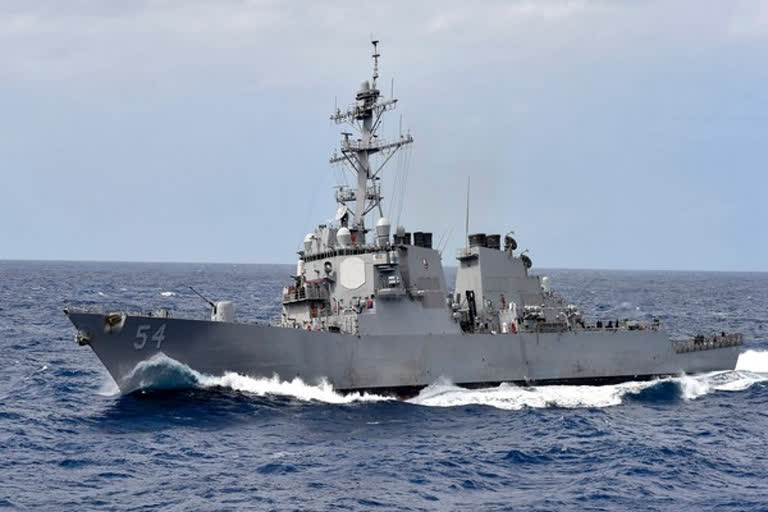New Delhi: July 12 marks the 5th anniversary of the historic South China Sea ruling of an international tribunal which declared China’s claims legally invalid in a South China Sea territorial dispute involving the Philippines, but the People’s Republic of China (PRC) continues to ignore the ruling and refuses to settle the maritime disagreements. The arbitral tribunal constituted under the 1982 law of the Sea Convention rejected PRC’s claim that it maintained historic rights over most of the South China Sea.
In the case of India, nearly 200 billion dollars worth of Indian trade passes through the South China Sea. And there is no denying the fact that freedom of the seas is a strong interest for nations and is vital to global peace and prosperity. The international community including India has long benefitted from the rules-based maritime order. But the growing belligerence of China and its indefinite claim in the South China Sea has put the rules-based maritime order under great threat.
Read:| Rajnath Singh calls for free, open and inclusive order in Indo-Pacific
Talking about what is at stake for India in the South China Sea, Professor Harsh V Pant, Head of the Strategic Studies at Observer Research Foundation, New Delhi, told ETV Bharat, “India has a lot of stake in the South China Sea because India believes in freedom of navigation and believes as a country that this principle should be observed both in principle as well as practice. Based on the principle of the freedom of seas, we have built the global order and India has been the beneficiary of the order”.
"China has also been the beneficiary of the order. Therefore, for India, it is important that this is maintained and Beijing’s claims are rebuffed because it is also a matter of countries like China claiming maritime territories in violation of International rules against some of the smaller countries in the region. It is also a question of the international community to help weaker and smaller states against the most powerful ones”, he added.
Read:| US Navy aircraft carrier back in South China Sea
“The stake that India has in the South China Sea is the larger principle of how international affairs are run and are conducted and how inter-state behaviour is regulated. The other aspect is that if China can use its might to challenge countries in the South China Sea, this is exactly what China is doing along its border with India, where it has unilaterally challenge the status quo. India feels that Chinese behaviour is very similar to what China is doing to India and what China has done to various smaller states in the region when it comes to the South China Sea. So for India, there are much at stake and therefore, India has taken a leading role in championing freedom of seas, Indo-Pacific because that is something India believes is important if global order is to be maintained”, Pant told ETV Bharat.
Notably, China’s unilateral actions on South China have had an immense effect. It has brought all the regional stakeholders including the Quad together. The leaders of the countries- United States, India, Japan, Australia known as Quad-held the first-ever summit earlier this year pledging to work for free and open Indo-Pacific relations and to cooperate on maritime and cybersecurity in the face of challenges from China. So much so that the Indo-Pacific has become geopolitically important for the world and many countries are eyeing the region. But China’s claim over the entire South China Sea, which is very rich in resources, has become a global concern.
“Freedom of seas is essential for global peace and prosperity, security. It has emerged in recent years as one of the fundamental principles of Inter-state relations and China has been challenging the fundamental principle. The global order post Second World War has been based on the fundamental reality of freedom of the seas. The economic growth of countries is based on this reality. So if the principle is ignored, violated and trampled upon then there is a challenge for the entire global order. The challenge for the international community is how to deal with the country that is not interested in international rules and arbitrary principles of inter-state conduct”, Professor Pant said.
Read:| Biden backs Trump rejection of China's South China Sea claim
As rightly pointed out by India’s Foreign Secretary Harsh Shringla during his London visit in November last year, today more and more countries are aligning their definition of Indo-Pacific with India’s. He had said that for India, the Indo-Pacific is that vast maritime space stretching from the western coast of North America to the eastern shores of Africa. Therefore, the region has become the biggest maritime flashpoint of the world and securing it from China’s aggressiveness and assertiveness is the biggest challenge that the world is facing currently.
On Sunday, Biden led US administration backed Trump’s rejection of South China Sea claims. It also reaffirmed that an armed attack on Philippine armed forces, public vessels, or aircraft in the South China Sea would invoke US mutual defence commitments under Article IV of the 1951 US-Philippines Mutual Defense Treaty.
"We call on the PRC (People’s Republic of China) to abide by its obligations under international law, cease its provocative behaviour, and take steps to reassure the international community that it is committed to the rules-based maritime order that respects the rights of all countries, big and small”, said a US state department statement attributed to Secretary of State Antony J Blinken.



